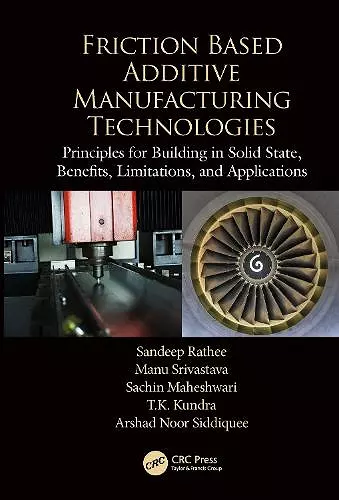Friction Based Additive Manufacturing Technologies
Principles for Building in Solid State, Benefits, Limitations, and Applications
Arshad Noor Siddiquee author Manu Srivastava author Sandeep Rathee author Sachin Maheshwari author TK Kundra author
Format:Paperback
Publisher:Taylor & Francis Ltd
Published:31st Mar '21
Currently unavailable, and unfortunately no date known when it will be back
This paperback is available in another edition too:
- Hardback£185.00(9780815392361)

Currently, most of the major commercial metal additive manufacturing (MAM) techniques rely on liquid phase processing. The liquid to solid phase transformations in these techniques results in microstructural issues and defects which in turn tantamount to inferior properties of fabricated build. Friction based additive manufacturing technologies are solid state processing techniques which work on the principles of friction based joining processes and layer by layer additive manufacturing. This book primarily addresses the basic understanding of seven friction based additive manufacturing techniques. These techniques include additive manufacturing methods based on rotary friction welding, linear friction welding, friction deposition, friction surfacing, friction stir additive manufacturing, friction assisted seam welding and additive friction stir. The principle of operations, benefits, limitations and recent developments of each technique has been described. It covers potentional and probable applications of each technique through review of various experimental studies.
Features
- Targets friction based solid state additive manufacturing of metallic materials
- Describes principle of operation of seven friction based additive manufacturing techniques
- Reviews latest trends of these processes via experimental studies
- Describes benefits and limitations of each technique
- Covers current and probable applications of these techniques <
ISBN: 9780367781330
Dimensions: unknown
Weight: 358g
148 pages